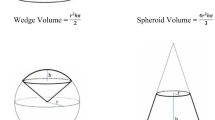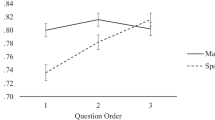Abstract
A typical mathematics assignment consists of a block of problems devoted to the same topic, yet several classroom-based randomized controlled trials have found that students obtain higher test scores when most practice problems are mixed with different kinds of problems—a format known as interleaved practice. Interleaving prevents students from safely assuming that each practice problem relates to the same skill or concept as the previous problem, thus forcing them to choose an appropriate strategy on the basis of the problem itself. Yet despite the efficacy of interleaved practice, blocked practice predominates most mathematics textbooks. As an illustration, we examined 13,505 practice problems in six representative mathematics texts and found that only 9.7% of the problems were interleaved. This translates to only one or two interleaved problems per school day. In brief, strong evidence suggests that students benefit from heavy doses of interleaved practice, yet most mathematics texts provide scarcely any.





Similar content being viewed by others
References
Allwood, M., Bullard, F., Chumas, M., Fritz, K., Harris, S., Humphrey, M., Kotz, B., Olsen, C., Peck, R., Sheets, K., Sukow, A., & Tate, S. (2014). SpringBoard mathematics: course 2. New York, NY: College Board.
Barzagar Nazari, K., & Ebersbach, M. (2019). Distributing mathematical practice of third and seventh graders: applicability of the spacing effect in the classroom. Applied Cognitive Psychology, 33, 288–298.
Bennett, J., Burger, E., Chard, D., Hall, E., Kennedy, P., Renfro, F., Roby, T., Scheer, J., & Waits, B. K. (2012). Holt McDougal mathematics: grade 7. Orlando, FL: Houghton Mifflin Harcourt.
Blazar, D., Heller, B., Kane, T., Polikoff, M., Staiger, D., Carrell, S., … & Kurlaender, M. (2019). Learning by the book: comparing math achievement growth by textbook in six common core states. Research Report. Cambridge, MA: Center for Education Policy Research, Harvard University.
Burger, E. B., Dixon, J. K., Kanold, T. D., Larson, M. R., Leinwand, S. J., & Sandoval-Martinez, M. E. (2014). Go math: middle school, grade 7. Orlando, FL: Houghton Mifflin Harcourt.
Carpenter, S. K., Cepeda, N. J., Rohrer, D., Kang, S. H. K., & Pashler, H. (2012). Using spacing to enhance diverse forms of learning: review of recent research and implications for instruction. Educational Psychology Review, 24, 369–378.
Carter, J. A., Cuevas, G. J., Day, R., Malloy, C. E., Kersaint, G., Reynosa, M., Silbey, R., & Vielhaber, K. (2015). Glencoe math: built to the common core. Columbus, OH: McGraw-Hill Education.
Chen, O., Castro-Alonso, J. C., Paas, F., & Sweller, J. (2018). Extending cognitive load theory to incorporate working memory resource depletion: evidence from the spacing effect. Educational Psychology Review, 30, 483–501.
Deans for Impact. (2015). The science of learning. Austin, TX: Deans for Impact.
Driskell, J. E., Willis, R. P., & Copper, C. (1992). Effect of overlearning on retention. Journal of Applied Psychology, 77, 615–622.
Dunlosky, J. (2013). Strengthening the student toolbox: study strategies to boost learning (pp. 12–21). Fall: American Educator.
Dunlosky, J., Rawson, K. A., Marsh, E. J., Nathan, M. J., & Willingham, D. T. (2013). Improving students’ learning with effective learning techniques: promising directions from cognitive and educational psychology. Psychological Science in the Public Interest, 14(1), 4–58.
EdReports.org (2019). Compare materials. Retrieved October 17, 2019, from www.edreports.org.
Foster, N. L., Mueller, M. L., Was, C., Rawson, K. A., & Dunlosky, J. (2019). Why does interleaving improve math learning? The contributions of discriminative contrast and distributed practice. Memory & Cognition, 47(6), 1088–1101.
Hake, S. (2012). Saxon math: course 2. Orlando, FL: Houghton Mifflin Harcourt.
Hopkins, R. F., Lyle, K. B., Hieb, J. L., & Ralston, P. A. (2016). Spaced retrieval practice increases college students’ short-and long-term retention of mathematics knowledge. Educational Psychology Review, 28(4), 853–873.
Jacob, B. (2001). Implementing standards: the California mathematics textbook debacle. Phi Delta Kappan, 83(3), 264–272.
Kotovsky, K., Hayes, J. R., & Simon, H. A. (1985). Why are some problems hard? Evidence from Tower of Hanoi. Cognitive Psychology, 17(2), 248–294.
Lappan, G., Phillips, E., Fey, J., & Friel, S. (2014). Connected mathematics, grade 7. Boston, MA: Pearson Education, Inc..
Larson, R., & Boswell, L. (2014). Big ideas math: a common core curriculum (Red ed.). Erie, PA: Big Ideas Learning, LLC.
Le Blanc, K., & Simon, D. (2008). Mixed practice enhances retention and JOL accuracy for mathematical skills. Paper presented at the 49th Annual Meeting of the Psychonomic Society, Chicago, IL.
Lyle, K. B., Bego, C. R., Hopkins, R. F., Hieb, J. L., & Ralston, P. A. S. (in press). How the amount and spacing of retrieval practice affect the short- and long-term retention of mathematics knowledge. Educational Psychology Review.
Mayfield, K. H., & Chase, P. N. (2002). The effects of cumulative practice on mathematics problem solving. Journal of Applied Behavior Analysis, 35(2), 105–123.
Ostrow, K., Heffernan, N., Heffernan, C., & Peterson, Z. (2015). Blocking vs. interleaving: examining single-session effects within middle school math homework. In Artificial Intelligence in Education (pp. 338–347). Cham: Springer.
Paas, F., & van Merriënboer, J. J. G. (1994). Variability of worked examples and transfer of geometrical problem-solving skills: a cognitive-load approach. Journal of Educational Psychology, 86, 122–133.
Pan, S. C. (2015). The interleaving effect: mixing it up boosts learning. Scientific American Mind.
Polikoff, M. (2018). The challenges of curriculum materials as a reform lever. EducationNext. Retrieved from www.educationnext.org/challenges-curriculum-materials-reform-lever
Rau, M. A., Aleven, V., & Rummel, N. (2013). Interleaved practice in multi-dimensional learning tasks: which dimension should we interleave? Learning and Instruction, 23, 98–114.
Roediger, H. L., & Pyc, M. A. (2012). Inexpensive techniques to improve education: applying cognitive psychology to enhance educational practice. Journal of Applied Research in Memory and Cognition, 1(4), 242–248.
Rohrer, D., & Taylor, K. (2006). The effects of overlearning and distributed practice on the retention of mathematics knowledge. Applied Cognitive Psychology, 20, 1209–1224.
Rohrer, D., & Taylor, K. (2007). The shuffling of mathematics practice problems boosts learning. Instructional Science, 35, 481–498.
Rohrer, D., Dedrick, R. F., & Stershic, S. (2015). Interleaved practice improves mathematics learning. Journal of Educational Psychology, 107, 900–908.
Rohrer, D., Dedrick, R. F., Hartwig, M. K., & Cheung, C. N. (2020). A randomized controlled trial of interleaved mathematics practice. Journal of Educational Psychology, 112, 40–52.
Sana, F., Yan, V. X., & Kim, J. A. (2017). Study sequence matters for the inductive learning of cognitive concepts. Journal of Educational Psychology, 109, 84–98.
Schutte, G. M., Duhon, G. J., Solomon, B. G., Poncy, B. C., Moore, K., & Story, B. (2015). A comparative analysis of massed vs. distributed practice on basic math fact fluency growth rates. Journal of School Psychology, 53(2), 149–159.
Sweller, J., Van Merriënboer, J. J. G., & Paas, F. G. W. C. (1998). Cognitive architecture and instructional design. Educational Psychology Review, 10, 251–296.
Taylor, K., & Rohrer, D. (2010). The effect of interleaving practice. Applied Cognitive Psychology, 24, 837–848.
Willingham, D. T. (2014). Strategies that make learning last. Educational Leadership, 72(2), 10–15.
Acknowledgments
We thank Sandra Stershic Kauffman and Chi-Ngai Cheung for their help with scoring.
Funding
The research reported here was supported by the Institute of Education Sciences, US Department of Education, through grant R305A160263 to the University of South Florida.
Author information
Authors and Affiliations
Corresponding author
Ethics declarations
Conflict of Interest
The authors declare that they have no conflict of interest.
Disclaimer
The opinions expressed are those of the authors and do not represent the views of the US Department of Education.
Additional information
Publisher’s Note
Springer Nature remains neutral with regard to jurisdictional claims in published maps and institutional affiliations.
Rights and permissions
About this article
Cite this article
Rohrer, D., Dedrick, R.F. & Hartwig, M.K. The Scarcity of Interleaved Practice in Mathematics Textbooks. Educ Psychol Rev 32, 873–883 (2020). https://doi.org/10.1007/s10648-020-09516-2
Published:
Issue Date:
DOI: https://doi.org/10.1007/s10648-020-09516-2




